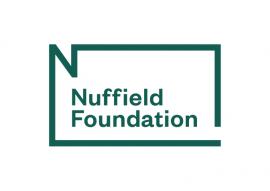- View more resources from this publisher
 Nuffield Foundation
Nuffield Foundation - View more resources from this publisherJohn Murray
Nuffield Mathematics Project
The aim of the Nuffield Mathematics Project was to devise a 'contemporary approach for students from 5 to 13'. The writing team started work in September 1964. The newly-formed Schools Council undertook to help by identifying a dozen pilot areas. These would ensure that a good number of teachers would tryout the materials with students and also provide Teachers' Centres where work could be discussed, criticised, improved and developed.
Running through all the work was the central notion that the students must be set free to make their own discoveries and think for themselves, and so achieve understanding, instead of learning through mysterious drills.
Rather than produce materials for students the team focused on a series of guides which did not comprise an entirely new syllabus, but put the emphasis on how to learn, not on what to teach.
The guides did not cover years, or indeed any specific time; they simply developed themes and therefore showed the teacher how to allow one student to progress at a different pace to another. They contained direct teaching suggestions, examples of apparently un-mathematical subjects and situations which could be used to develop a mathematical sense, examples of students' work, and suggestions for class discussions and out-of-school activities.
The Guides fall into three categories: Teachers' Guides, Weaving Guides and Check-up Guides.
The Teachers' Guides cover five main topics: Computation and Structure, Shape and Size, Graphs Leading to Algebra, Logic and Probability and statistics.
The Weaving Guides are single-concept books which give detailed instructions or information about a particular subject.
The Check-ups Guides were intended to provide information on the students' progress. As traditional tests were difficult to administer in the new atmosphere of individual discovery it was the intention of the authors to replace these by individual check-ups for individual students.
Resources
Filter
I Do and I Understand
This guide explains the intentions of the Nuffield Mathematics Project, gives detailed descriptions of the ways in which a changeover from conventional teaching can be made and faces many of the problems that will be met.
The contribution of the psychologist Piaget to the development of mathematics is...
Nuffield Mathematics for Overseas Teachers
This series of books was planned and commissioned by the Centre for Curriculum Renewal and Educational Development Overseas (CREDO), which was established in 1966 to help developing countries with their own programmes of educational innovation by making available to...
Problems for the Early Secondary Years
These four sets of problems, from the Nuffield Mathematics Project, have been designed for young secondary-school students. It was hoped that teachers would find them useful in conjunction with the main work described in the teachers' guides. The majority of the...
Challengers A
This resource is aimed to provide stimulus to students following the Nuffield Maths Project and consists of a number of extension activities, challenges and puzzles. The mathematics covered includes number puzzles such as finding the missing numbers in number sequences, the missing numbers in calculations,...






